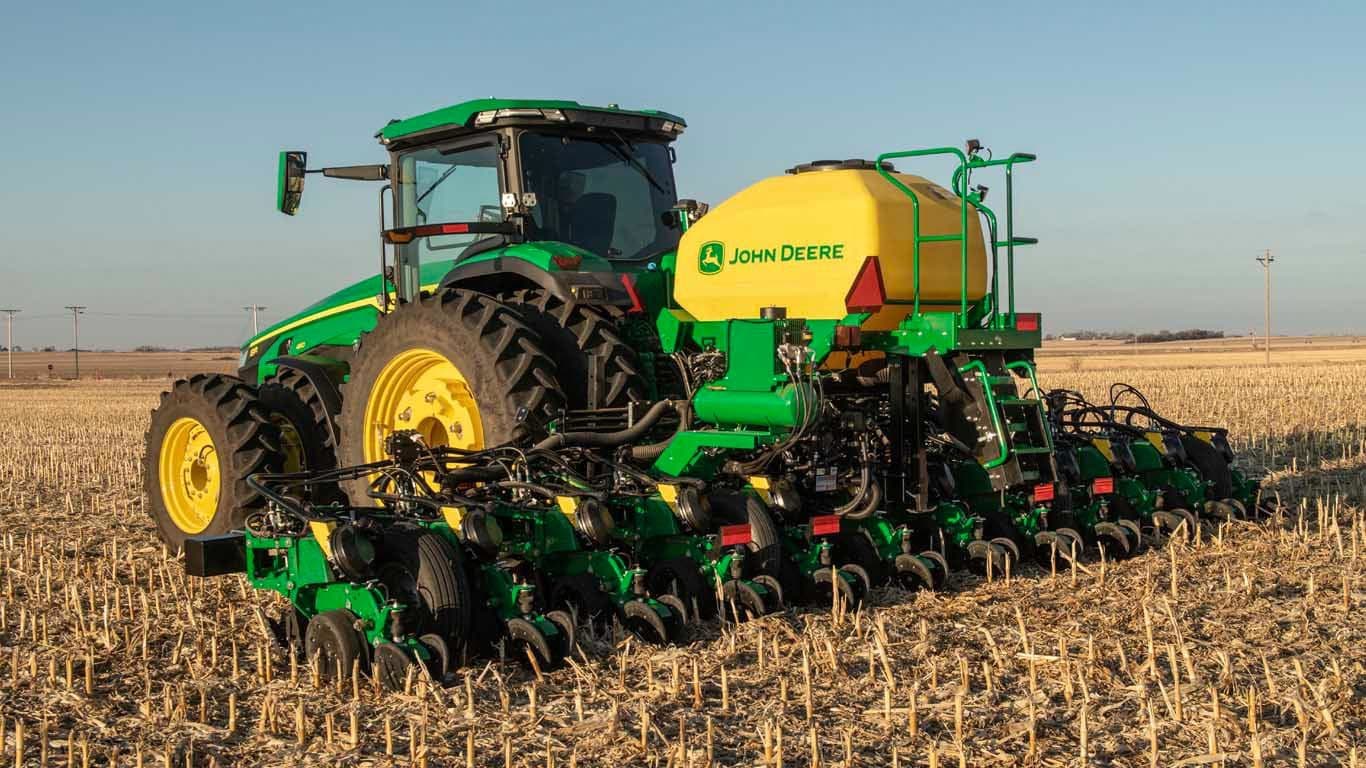
John Deere MP516
Drawn Planter
- Vertical fold toolbar
- 16-row, 30-in. spacing
- ExactEmerge™ row units
- Individual Row Hydraulic Downforce
- 55-bu. CCS tank
View Product Brochure
Features
It is very challenging to get the crop planted during the optimum planting window or as close to the optimum planting day as possible. Rate-of-yield loss accelerates greatly after the optimum window has passed. This is especially true in the northern U.S. and Canada. ExactEmerge maintains accurate speed placement at higher speeds; growers can avoid missing that peak planting time, thereby helping to get the highest crop yields.
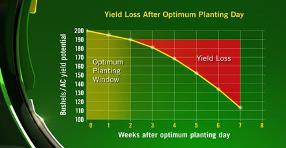 Yield loss after optimum planting day
Yield loss after optimum planting day
With the BrushBelt trench delivery system, the spacing in the trench does not change from even to uneven terrain. This can be a problem with a traditional seed tube. Seed bounce and ricochet may occur as slopes increases, ultimately decreasing seed spacing performance.
The design of the BrushBelt system provides the best solution for the lowest release of seed to the bottom of the trench. The use of a brush provides the meter with an infinite amount of placement opportunities for each seed. This is what gives producers the confidence that every seed will have the desired spacing that a seed tube cannot provide.
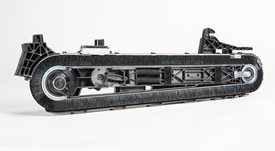 Maintenance-free BrushBelt system
Maintenance-free BrushBelt system
When the brush comes around the pulley, it expands and allows the seed to be transferred from the bowl to the brush very easily. The brush then carries the seed down toward the trench, ensuring that there is no movement as it moves down the length of the cartridge.
Once the brush reaches the lower pulley, the BrushBelt system expands again to loosen the grip on the seed, and the centrifugal force releases the seed. Another advantage with the BrushBelt system and cartridge at all speeds up to 16.1 km/p (10 mph) is the ability to match the seed rearward trajectory to the forward ground speed of the planter. This provides a dead drop of the seed with no bounce and no roll at the bottom of the trench.
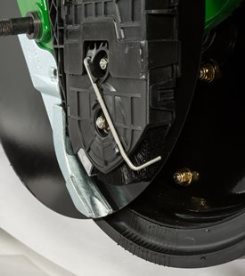 BrushBelt conditioner engages brush bristles
BrushBelt conditioner engages brush bristles
John Deere’s ExactEmerge cartridge is self-cleaning. When an operator uses seed treatments or is forced to plant in less than ideal soil conditions, the design of the trench delivery system sheds buildup from the BrushBelt. A brush conditioner is located at the bottom of the cartridge to remove remaining residue and prevent the bristles from sticking together.
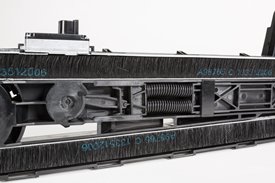 Brush proximity helps clean sensor
Brush proximity helps clean sensor
Another advantage over a seed tube is that the BrushBelt system also acts as a cleaner to the seed sensor compared to a seed tube.
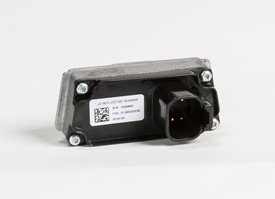 Sensors for trench delivery system
Sensors for trench delivery system
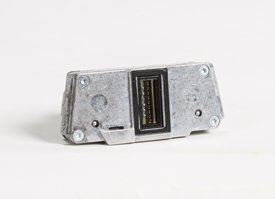 Reflective seed sensor
Reflective seed sensor
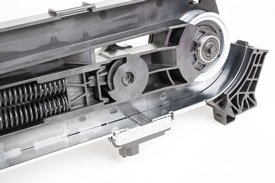 Sensor on trench delivery system
Sensor on trench delivery system
On all ExactEmerge row-units, each cartridge is equipped with sensors. As the seeds are being delivered through the BrushBelt delivery system controls, they pass the reflective seed sensor. The delivery system slides every seed past the seed sensor to read and send the signal to the controller. The seed sensor and design can provide sensor performance at higher seeds per second with no population adjustment as needed with seed tube sensors. This seed sensor data is actual row-unit performance data. In comparison, seed tube sensors add 10 percent population in soybean planting to adjust for the seeds missed due to placement within the seed tube. The BrushBelt system holds each seed in place until released in the trench, allowing the seed sensor a more accurate read.
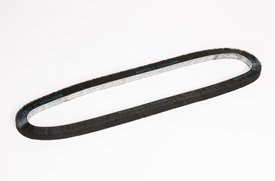 BrushBelt removed from trench delivery system
BrushBelt removed from trench delivery system
The BrushBelt system requires no maintenance and has a wear life designed to match the wear life of the other wear components. Since operations vary, as do soils and field content, it is recommended to replace the BrushBelt after noticeable wear or decreased performance.
Changing the belt is easy. One latch removes the meter over the trench delivery system. Grab the cartridge by the grip and pull toward the body, releasing it from the electric motor fitting. Lift the trench delivery system up and remove the sensor wiring harness to completely pull the cartridge out of the row-unit.
There are two plastic covers that snap off to uncover the belt; remove the covers and then twist the circular spring tensioner dial with the yellow arrow on it to release the tension on the springs. Once tension has been removed, pull the belt out. It is also recommended to change the stainless-steel wear strip at this time as well, which also slides right out of place without the use of tools.
NOTE: It is recommended to use a talc/graphite mixture with ExactEmerge. Best results have been 80 percent talc and 20 percent graphite. For certain regions and territories, talc and talc/graphite mixes are restricted from use; in this case, use a wax-based fluency agent.
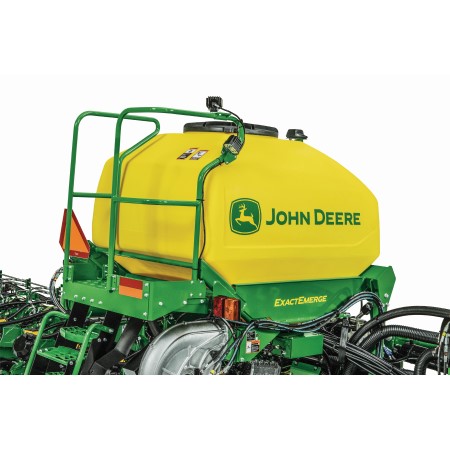 1938 L (55 bu) CCS tank with LED tank lights
1938 L (55 bu) CCS tank with LED tank lights
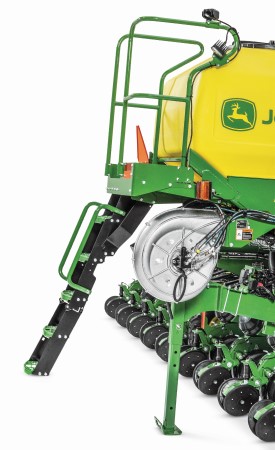 Redesigned folding staircase and relocated blower
Redesigned folding staircase and relocated blower
Several improvements have been made to the 1725C CCS tank and surrounding areas. The redesigned folding staircase is ergonomically friendly and stays out of the way of obstacles while planting. This change leads to the larger 1938-L (55-bu) CCS tank to help reduce fill times and let operators get the planting done quicker. The CCS tank has been raised 16.5-cm (6.5-in.) for added clearance of tank clean out, and the CCS blower has been relocated to lessen noise in the cab. The raised CCS tank and relocated blower also provide better visibility to the center row units.
CCS seed delivery adds productivity through:
- Increased seed capacity
- Bulk fill capability
- Easy, thorough cleanout
Filling the tanks is convenient due to a central filling location. The staircase and railing provide access to the filling platform between the tanks. Additionally, each tank has an adjustable bin-level sensor to alert the operator when it is time to fill.
A light-emitting diode (LED) fill light package is included on machines equipped with CCS. This feature includes two LED lights conveniently mounted on the railings of the machine. The lights are turned on and off with their own switch located at the bottom of the staircase.
If the seed-carrying vehicle requires hydraulic power to run the unloading system, the auxiliary hydraulic coupler option is available. These couplers are located at the bottom of the staircase and can be coupled under pressure. The system has a separate system filter that ensures the planter hydraulic system remains free of contaminants.
Seed delivery process
The 1938-L (55-bu) CCS tanks allow operators to spend less time filling and more time planting.
The CCS seed delivery process relies on a hydraulically driven fan to move seed from the CCS tanks to the row-unit hoppers. A flow control valve and gauge, located near the tank, allows for the proper tank pressure setting based on seed type. For normal operation, the CCS functions of fan and agitator control, as well as bin level sensing alerts, are controlled by status of the height switch. The CCS functions are enabled when the machine is lowered and disabled when the machine is raised. In addition, the CCS functions can be engaged for CCS hose cleanout using the switch on the back of the planter when oil flow is present. On models with software-based CCS control, CCS functions can be enabled or disabled through software interface in the cab as well as the switch on the back of the planter.
Air from the fan pressurizes the CCS tanks and delivers seed to the seed hoppers. Airflow enters the seed tanks through a nozzle in the manifold which pressurizes the tank. The air then picks up seed and moves it out the other end of the nozzle into seed delivery hoses. These hoses route the seed toward the hopper. A small amount of seed is traveling in the delivery hoses only when needed.
The hopper fills with seed until the delivery hose (discharge elbow) is covered. Once the opening is restricted, seed flow through the hose stops. Air flowing to the row-unit travels into the hopper and is the source of air for the vacuum system. This provides a much cleaner air source than previous meter designs. As the seed is picked up by the meter and planted, the seed pool shrinks until the end of the delivery hose is uncovered. At that time, the airflow and seed delivery resume and the seed pool in the hopper is replenished.
CCS seed cleanout
Seed cleanout is easy with a CCS planter. The CCS tank has been raised 16.5-cm (6.5-in.) for added clearance of tank clean out. When finished planting, any remaining seed can simply be removed via access doors at the bottom of the CCS tank.
CCS seed delivery hoses are then purged with air from the CCS fan, and the excess seed is pushed to the individual meters. The vacuum meter door is opened and seed is removed with the supplied catch pan.
Small seed CCS components
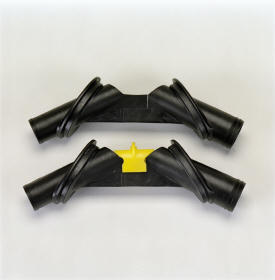 Manifold nozzle and nozzle with cover installed
Manifold nozzle and nozzle with cover installed
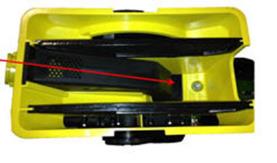 Straight seed inlet installed in mini-hopper
Straight seed inlet installed in mini-hopper
CCS seed delivery system increases planting productivity across the approved crops listed above. While highly effective delivering seed from the CCS tanks to the vacuum meters, small or light seeds require two additional components to aid in proper seed delivery.
Manifold nozzle covers (clips) should be installed to ensure seed is adequately picked up into the air stream for delivery to the row-unit. Mini-hopper discharge elbows should also be changed from the standard elbow (holes) to the small seed elbow (slotted openings) when planting sorghum (milo) and small cotton.
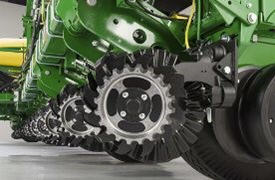 Coulter combo row cleaner
Coulter combo row cleaner
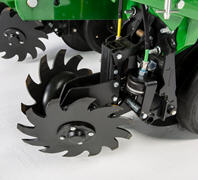 Easy Adjust row cleaner
Easy Adjust row cleaner
Easy Adjust row cleaner and coulter combo provides a pneumatic row tillage solution that is controlled from the seat of the tractor.
Every decision to make an adjustment during spring planting reduces the acres planted per day and can increase or decrease profitability. An adjustment that can be overlooked is row cleaners due to planter size, difficulty to make the adjustment, and varying conditions across fields and time.
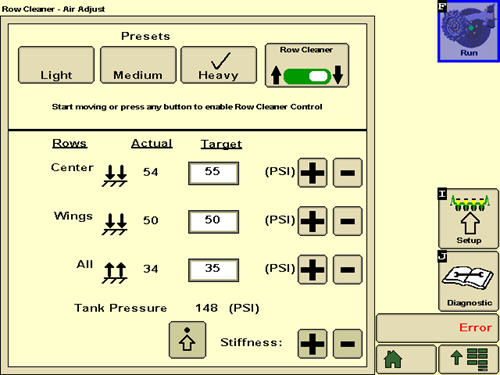 GreenStar™ 3 2630 Display view for row cleaners compatible with SeedStar™ 3 HP
GreenStar™ 3 2630 Display view for row cleaners compatible with SeedStar™ 3 HP
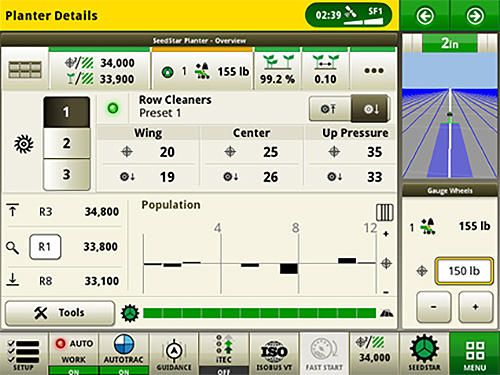 4600 CommandCenter™ Display and 4640 Universal Display view for row cleaners compatible with SeedStar 4HP
4600 CommandCenter™ Display and 4640 Universal Display view for row cleaners compatible with SeedStar 4HP
With the Easy Adjust row cleaners on ExactEmerge™ planters, operators now have a pneumatic solution to make on-the-go adjustments that is controlled directly from the seat of the cab. They can be raised from the cab as needed with the push of a button for wet areas, waterways, or end rows. For growers using SeedStar 3 HP, the row cleaners are completely integrated into the John Deere GreenStar 3 2630 Display as well as the Gen 4 4600 CommandCenter display or 4640 Universal Display. For growers using SeedStar 4HP, a 4600 CommandCenter display or 4640 Universal Display is required.
The Easy Adjust row cleaners have the capability to save three presets for varying ground engagement based on field conditions. The system is controlled in three sections: at each wing as well as the center (frame or wheel) track rows. The pneumatic lines use air from the active pneumatic downforce compressor, requiring no additional compressor to be installed on the planter. The Easy Adjust row cleaners utilize down and up force air bags. The adjustable air pressure setting for each bag allows the operator to set the ride of the row cleaner depending on the field conditions and the desired results. Making these on-the-go adjustments from tractor cab increases productivity and performance during planting.
For Easy Adjust row cleaner Precision Upgrade options, see the ordering guide.
The row cleaner-only option utilizes parallel linkage to provide the floating action growers require in their fields. Parallel linkage allows for the unit to float up and down in the situation of hills or hard objects. The cleaner and coulter combo does not have parallel linkage, however, the row cleaners have floating rings installed to help provide the same benefits.
The row cleaners utilize the field-proven SharkTooth® design. Row cleaners play a major role in maximizing yield toward uniform emergence, reducing row-unit bounce, and maintaining proper depth. The Easy Adjust row cleaners provide growers with quick and stress-free solutions to customizing the planter in variable field conditions. They are available on most ExactEmerge and MaxEmerge 5e equipped planters.
SharkTooth is a trademark of Yetter Manufacturing Incorporated.
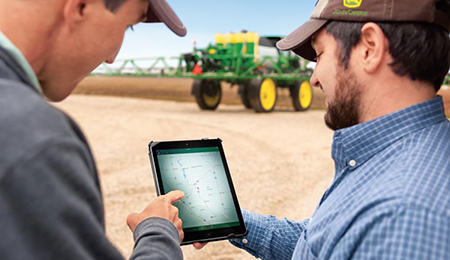 Connected Support technology
Connected Support technology
When you buy John Deere equipment, you expect reliability. You also know that problems can happen, and a product is only as good as the support behind it. That’s why John Deere equipment is prepared with technology that senses potential issues and can alert you and your dealer promptly—in the cab or anywhere you are.
John Deere Connected Support is a revolutionary change to support that leverages technology and the connectivity of JDLink™ telematics to prevent downtime and resolve problems faster. These tools decrease downtime by an average of 20 percent, enabling faster responses to unexpected problems and reducing technician trips to your machine. For some issues, unplanned downtime can even be prevented altogether through prediction of the issue.
With your permission, John Deere Connected Support:
- Keeps you running by monitoring machine health and promptly alerting you and your dealer of issues
- Saves time by remotely viewing in-cab displays, reducing trips to the machine
- Reduces or even eliminates technician trips to a machine through remote diagnostic and remote software reprogramming capabilities
- Connects experts with the information needed to respond to downtime faster and prevent it altogether
With more than a decade of experience leveraging connectivity to solve problems, no one else has the experience, tools, and knowledge to keep you running as John Deere and your John Deere dealer can. Connected Support is an in-base feature on all John Deere products with factory- or field-installed JDLink.
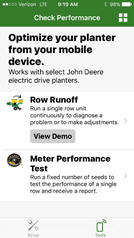 Row Runoff diagnostic test
Row Runoff diagnostic test
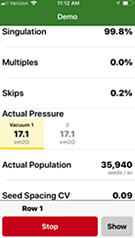 The test functions from a mobile device
The test functions from a mobile device
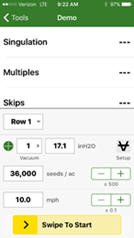 Determine optimum settings without being in the cab
Determine optimum settings without being in the cab
The first day of planting season can be as productive as the last with mobile row-unit runoff. The mobile row-unit runoff activation on the planter main controller (PMC) allows operators to make adjustments to maximize row-unit performance from a mobile device at the rear of the planter for both preseason and in-season use - all enabled through the Equipment Mobile app.
Mobile row-unit runoff allows growers to perform test-stand functions from a mobile device connected to the planter.
The row runoff test provides complete diagnostic checks both preseason and in season. With the row-unit runoff test, the operator can make adjustments from the mobile device, including vacuum pressure, to determine the optimum meter and vacuum settings. This app functionality will help avoid making trips to the cab while validating meter performance.
During preseason planter inspections and set up, utilize the meter performance test to validate meter accuracy, similar to a test stand without leaving the farm. Test all systems on the planter, not just the meter, providing confidence that all planter systems are ready to plant. Reports are generated from the test providing information the operator can save and send for future reference.
Before heading to the field, the operator will benefit from knowing the best row-unit and vacuum settings for each variety selected to plant that spring.
Watch this video to see mobile row-unit runoff in action.
Mobile row-unit runoff will work with any model year 2015 or newer ExactEmerge™ or MaxEmerge™ 5e equipped planter. Mobile row-unit runoff can be added with attachment AA93169.
For model year 2018 and newer ExactEmerge planters, mobile row-unit runoff is included in base equipment. For model year 2020 and newer MaxEmerge 5e planters, mobile row-unit runoff is included in base equipment. For planters not equipped from the factory, mobile row-unit runoff can be added with attachment AA93169. A mobile row-unit runoff and Easy Fold package can be added with attachment AA97849 (only available with 1775NT and 1795 Planters with a 2-point hitch and model year 2019 and newer DB Planters with Gen 4 based frame folding).
NOTE: Mobile runoff utilizes the Equipment Mobile app available on select iPad® tablets, iPhone® smartphones, and Android™ devices.
Mobile row-unit runoff and Easy Fold aftermarket for field conversion kits
The below software bundles include the functionality explained above for machines not ordered with the feature from the factory. Compatible machines include all the necessary sensors and harnesses needed to make the feature function. The attachment part is software only. Follow the mobile runoff ordering and software push guide below for ordering and installation.
SeedStar™ 3 HP conversion to SeedStar 4HP
Mobile runoff ordering and software push guide
iPad and iPhone are trademarks of Apple Inc. Android is a trademark of Google LLC.
Specs & Compare
Key Specs | MP516 Current Model |
| Number of rows | 16 |
| Row spacing | 76.2 cm 30 in. |
| Frame - Fold configuration | Vertical fold |
| Frame - Flexibility | Up: 10 degree (angle) Down: 7 degree (angle) |
| Row unit seed hoppers | Central Commodity System: 1,938 L 55 bu |
| Seed Meters | |
Rows and Row Spacing | |
| Number of rows | 16 |
| Row spacing | 76.2 cm 30 in. |
Frame | |
| Fold configuration | Vertical fold |
| Frame tube size | |
| Fold-and-go from tractor cab | |
| Flexibility | Up: 10 degree (angle) Down: 7 degree (angle) |
Hitch | |
| Base | |
| Optional | |
| Rear hitch | |
Lift System | |
| Type | Semi-integral only |
| Number of cylinders | |
Tires | |
| Base | 12.5L-15SL 20 ply implement: 303 kPa 3.0 bar 44 psi 7.60-15 8 ply implement: 359 kPa 3.6 bar 52 psi 7.6-15 6 ply - traction: 276 kPa 2.8 bar 40 psi |
| Optional | |
| Quantity | |
Row Units | |
| Type | ExactEmerge™ row units |
| Opener | Tru-Vee Double Disk |
| Depth gauging | |
| Adjustment | |
| Walking wheels | |
| Row unit seed hoppers | Not available |
| Row unit down force | Individual Row Hydraulic Downforce (IRHD) |
| Scrapers, opener blades | |
| Seed tube sensors | |
Seed Meters | |
| Base | Vacuum |
| Optional | |
| Finger pickup | |
| Radial bean meter | |
| Central Commodity System | Seed capacity 1938 L 55 bu Yes |
Drive System | |
| Base | Electric drive: 56 V |
| Optional | |
| Number of drive wheels | |
| Drive wheel disconnect | |
| Counter shaft | |
| Drill shaft | |
| Seed transmission | |
| Transmission combinations | |
Markers | |
| Type | |
| Control | |
| Marker disk | |
| Shear bolt protection | |
| Less marker option | |
Closing System | |
| Rubber tire closing system | |
| Cast iron closing system | |
Herbicide and Insecticide | |
| Insecticide only hopper | |
| Herbicide only hopper | |
| Insecticide and herbicide hopper | |
Liquid Insecticide System | |
| System available | |
| Tank capacity | |
Seed Monitor System | |
| Base | SeedStar™ 5 |
| Optional | |
Tillage Attachments | |
| Unit-mounted coulter | |
| Frame-mounted coulter | |
| Bubble blade | |
| .63-in. fluted blade (25 flutes) | |
| .7-in. fluted blade (13 flutes) | |
| 1-in. fluted blade (8 flutes) | |
| Row tillage support hanger | |
| Tine tooth | |
| Cons. furrower w/ leading cutout blade | |
| V-wing bed sweeps | |
| Row cleaner | |
| Row cleaner - unit-mounted coulter | |
| Row cleaner - unit-mounted DD fert. opener | |
Fertilizer | |
| Onboard / towed / tractor tanks | |
| Tank capacity | |
| Fixed-rate application | |
| Variable-rate application | |
| Pump type | |
| Pump rate | |
| Fertilizer opener type | |
| Flow divider distribution system | |
| Pressure manifold distribution system | |
| Dry fertilizer | |
| ExactRate Fluid Transfer System | |
Dimensions | |
| Transport width (with markers) | |
| Transport width (without markers) | From 5.5 to 6.8 m 17 ft 11 in. to 22 ft 2 in. |
| Transport length | |
| Transport height | From 1.6 to 4.01 m 5 ft 2 in. to 13 ft 2 in. |
| Transport weight | |
| Transport underframe clearance | On 8000 Series tractors with 18.4-42 tires: 4 m 13.2 ft |
| Field operation height | |
| Field operation width | |
| Field operation length | |
Ag Management Solutions | |
| Map-based seeding | |
| Field documentation | |
| Parallel tracking | |
Additional Information | |
| Recommended tractor horsepower | 8030, 8R, 8RX, 8030T and 8RT Series Tractor (power take-off [PTO] power of 216 kW [290 hp] or more) 3-point lift capacity of greater than 7300 kg (16,100 lb) Min Three or four selective control valves (SCVs) for power beyond, load sense, and case drain hydraulic connections are required, depending on machine options: SCV 1 – wing downforce/gull wing (when equipped), SCV 2 – fold/unfold, SCV 3 – CCS, SCV 4 – vacuum Power beyond – Individual Row Hydraulic Downforce (IRHD), ExactRate™ fertilizer, or PDF compressor with load sense Load sense – IRHD, ExactRate fertilizer, or PDF compressor with load sense Case drain – vacuum or PDF compressor with load sense Independent-Link Suspension (ILS™) or 1500 mechanical front-wheel drive (MFWD) tractor front axle required Rear duals and full set of front weight |
| Recommended tractor hydraulics | Hydraulic oil required to operate the planter: 227 L/min (60 gpm) Hydraulic system standby pressure: 15,513 kPa (155 bar) (2250 psi) Hydraulic system working pressure: 20,684 kPa (207 bar) (3000 psi) Hydraulic system burst pressure: 82,737 kPa (827 bar) (12,000 psi) |
| Warranty length | |
| Date collected |

